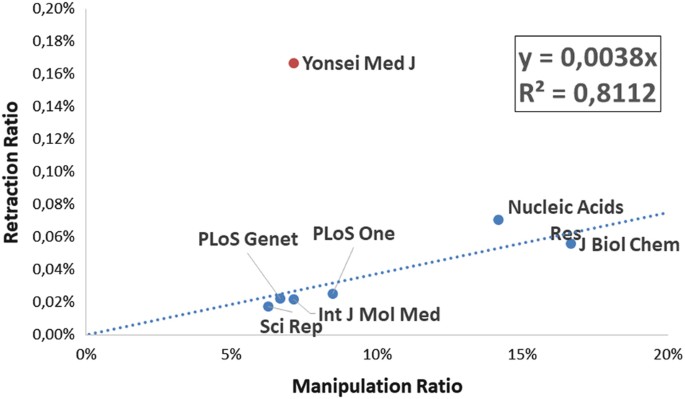
# Critique Concerning **Scientific Reports** and Its Management of Fraudulent Research
In a noteworthy turn of events in the academic publishing realm, **Scientific Reports**, a leading open-access journal under Springer Nature, is undergoing intense criticism for permitting fraudulent research to evade its peer-review framework. This predicament came to light after the release of an [open letter](https://deevybee.blogspot.com/2024/10/an-open-letter-regarding-scientific.html) endorsed by many prominent advocates for research integrity. The letter expressed serious worries, asserting that the journal published articles featuring obvious flaws, including irrelevant references, nonsensical figures, and the employment of ‘tortured phrases.’
## The Escalating Issue of ‘Tortured Phrases’ and Deceptive Practices
One of the primary concerns highlighted in the letter is the occurrence of **’tortured phrases’**. This expression describes poorly constructed sentences that may signify efforts to mislead plagiarism-checking tools. For example, an author might opt for “man-made consciousness” instead of the conventional term “artificial intelligence” to circumvent the detection of previously published content. While such expressions might temporarily escape scrutiny, they are noticeable due to their clumsy and unnatural phrasing within the scientific discourse.
A case illustrating the journal’s deficiencies involves a newly corrected article that was originally flagged for including a multitude of tortured phrases. Even though these issues were recognized during the review process, they were not addressed or dealt with until after the article’s publication. **Elizabeth Bik**, **Dorothy Bishop**, and **Guillaume Cabanac**, acknowledged experts in forensic research, were among the notable signatories of the letter, voicing their disappointment regarding Springer Nature’s **”insufficient response”** to apprehensions over erroneous publications.
Their shared perspective is that such significant editorial oversights **”cannot simply be chalked up to negligence”**—a sentiment underscored by the co-signers, who contend that the journal has revealed considerable inadequacies in upholding high academic standards.
## Worrying Statistics: Retractions and Articles Under Scrutiny
The letter cites a striking figure: since 2014, **3,702** articles in _Scientific Reports_ have been marked for featuring tortured phrases, providing troubling evidence of dubious editorial practices. Additionally, the journal has retracted **262** articles during the same timeframe, according to the [**Retraction Watch**](http://retractiondatabase.org/RetractionSearch.aspx#?jou%3dScientific%2bReports) database that monitors the reasons for academic paper retractions.
Most alarming is that _Scientific Reports_ publishes a **vast number of papers annually**—approximately 23,000 articles in 2024 alone. With each article incurring a publication fee of £2,090, the journal reportedly generated about **£49 million** from article processing fees this year. Experts like Dorothy Bishop maintain that such significant revenue should empower the journal to devote sufficient resources to **“eliminate”** fraudulent or inferior content and enhance the peer-review process.
In contrast, another major open-access journal, **PLOS One**, which releases around 14,000 articles each year, has pulled nearly **500 papers** during the same period. This indicates a higher level of editorial rigor, particularly when juxtaposed with the growing number of flagged and retracted articles at **Scientific Reports**.
## The Larger Picture: Rising Retraction Rates in Academia
The apprehensions voiced regarding **Scientific Reports** arise amidst a wider discourse on the escalating rates of retractions across various academic journals. A [2021 study](https://www.nature.com/articles/d41586-024-01609-0) cited by **Nature** indicated that the retraction rate for European biomedical-science articles had quadrupled from 2000 to 2021. Alarmingly, **67%** of these retractions were associated with **research misconduct**, encompassing data fabrication and authorship fraud.
Further complicating the situation for Springer Nature, another of its journals—**Optical and Quantum Electronics**—retracted over **200 papers** in a brief span since early September 2024. This uptick in retractions from Springer Nature–affiliated publications raises urgent questions about the quality of oversight and the integrity of the peer-review processes across its various platforms.
While the rise in retraction statistics may signal an escalating issue of academic fraud, it could also reflect, to some extent, a result of **enhanced detection methods** that more adeptly identify problematic research. Novel tools and strategies—such as AI-driven plagiarism detection software—facilitate greater scrutiny in uncovering previously overlooked research misconduct.
Nonetheless, the reality that so many papers passed through peer review relatively unscathed—only to be flagged later—elicits concerns about whether journals like **Scientific Reports** possess the appropriate editorial safeguards and expertise to eradicate fraudulent content before publication.
## Suggestions and Urgent Appeals for Action
The [open letter](https